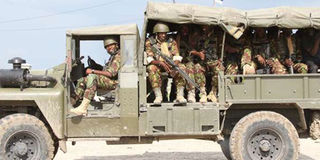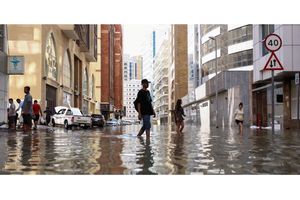KDF involved in illicit charcoal exports from Somalia: UN

Kenya Defence Forces soldiers patrol Afmadow town in Somalia on November 22, 2015. Kenyan troops assigned to the African Union Mission in Somalia (Amisom) receive $2 per bag of charcoal loaded at the port of Kismayu, the UN group said on November 4, 2016. PHOTO | NATION MEDIA GROUP
What you need to know:
- Kenyan troops assigned to the African Union Mission in Somalia (Amisom) receive $2 (Sh202) per bag of charcoal loaded at the port of Kismayu, the UN group says, citing “charcoal industry and non-governmental organisations sources”.
New York. Kenyan forces in Somalia are receiving fees for allowing illicit exports of charcoal from a port under their control, a United Nations monitoring group said in a report published Friday.
Kenyan troops assigned to the African Union Mission in Somalia (Amisom) receive $2 (Sh202) per bag of charcoal loaded at the port of Kismayu, the UN group says, citing “charcoal industry and non-governmental organisations sources”.
The report estimates that up to six million bags of charcoal have been exported annually from Kismayu and Buur Gaabo, another port that is adjacent to a Kenyan base.
Kenya Defence Forces (KDF) units may thus have reaped as much as $12 million (Sh1.2bn) a year from charcoal exports banned by the UN Security Council in 2012 in an effort to cut off funding for Al-Shabaab.
“The Kenyan contingent of Amisom continues to play a substantial role in the illicit export of charcoal from Somalia,” the UN monitoring group declares in its 247-page report.
Amisom has not replied to a request that the UN group made nine months ago for information on steps to prevent charcoal exports and ensure compliance by countries contributing troops to the AU mission.
Al-Shabaab has recently become less reliant on the charcoal trade, however, due in part to “improved enforcement of the charcoal ban by importing countries”, the report points out. It says the charcoal export economy in Somalia is now based on an alliance between the Interim Juba Administration and business interests in Kismayu. Shabaab has actually begun attacking or detaining charcoal burners and traders in territory where it wields influence, the report adds.
The group’s shift is said to result from the breakdown of a profit-sharing deal with Ahmed Mohamed Islam, the president of Jubaland State who is also known as “Madobe.”
“Once ‘Madobe’ cut Al-Shabaab out of a share of the proceeds from charcoal exports, the group retaliated, using coercion with the apparent motive of diminishing the revenue being accrued to the Interim Juba Administration from the continuing charcoal trade,” the report states.
To offset losses of revenue from charcoal smuggling, Shabaab is increasing its illicit export of sugar to Kenya, the UN experts say.
Shabaab previously taxed the transport of sugar from Kismayu into Kenya at $1,000 per truck, the report notes. (NMG)




